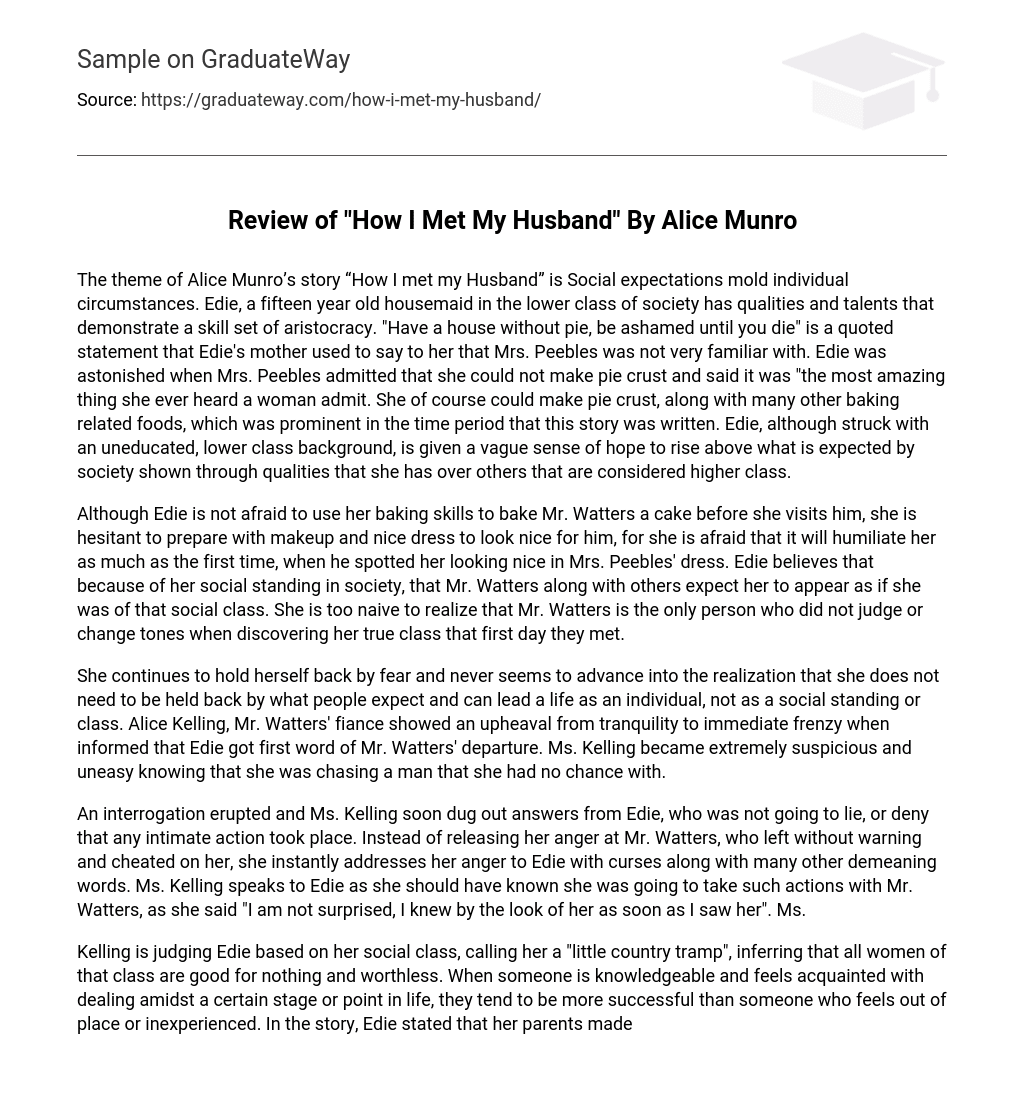The theme of Alice Munro’s story “How I met my Husband” is Social expectations mold individual circumstances. Edie, a fifteen year old housemaid in the lower class of society has qualities and talents that demonstrate a skill set of aristocracy. “Have a house without pie, be ashamed until you die” is a quoted statement that Edie’s mother used to say to her that Mrs. Peebles was not very familiar with. Edie was astonished when Mrs. Peebles admitted that she could not make pie crust and said it was “the most amazing thing she ever heard a woman admit. She of course could make pie crust, along with many other baking related foods, which was prominent in the time period that this story was written. Edie, although struck with an uneducated, lower class background, is given a vague sense of hope to rise above what is expected by society shown through qualities that she has over others that are considered higher class.
Although Edie is not afraid to use her baking skills to bake Mr. Watters a cake before she visits him, she is hesitant to prepare with makeup and nice dress to look nice for him, for she is afraid that it will humiliate her as much as the first time, when he spotted her looking nice in Mrs. Peebles’ dress. Edie believes that because of her social standing in society, that Mr. Watters along with others expect her to appear as if she was of that social class. She is too naive to realize that Mr. Watters is the only person who did not judge or change tones when discovering her true class that first day they met.
She continues to hold herself back by fear and never seems to advance into the realization that she does not need to be held back by what people expect and can lead a life as an individual, not as a social standing or class. Alice Kelling, Mr. Watters’ fiance showed an upheaval from tranquility to immediate frenzy when informed that Edie got first word of Mr. Watters’ departure. Ms. Kelling became extremely suspicious and uneasy knowing that she was chasing a man that she had no chance with.
An interrogation erupted and Ms. Kelling soon dug out answers from Edie, who was not going to lie, or deny that any intimate action took place. Instead of releasing her anger at Mr. Watters, who left without warning and cheated on her, she instantly addresses her anger to Edie with curses along with many other demeaning words. Ms. Kelling speaks to Edie as she should have known she was going to take such actions with Mr. Watters, as she said “I am not surprised, I knew by the look of her as soon as I saw her”. Ms.
Kelling is judging Edie based on her social class, calling her a “little country tramp”, inferring that all women of that class are good for nothing and worthless. When someone is knowledgeable and feels acquainted with dealing amidst a certain stage or point in life, they tend to be more successful than someone who feels out of place or inexperienced. In the story, Edie stated that her parents made the effort and sent her to high school, but she could not cope with the atmosphere after a year of trying which resulted in her failure.
Edie is a smart girl, although shown as naive in the story, she shines in places where even the educated might not. She illustrates her experience in cooking and creativity, where people even of a higher class cannot show. People who are educated may look down at others and expect them to fail at certain things that they believe cannot be done by someone who is not knowledgeable. What people such as Ms. Kelling do not understand is that people such as Edie do not deserve to be judged based on their social standing but on the content of their character.
Expectancy is a definition that changes in the eyes of every single individual based on different subjects, topics, and matters. One may expect another to act on a certain situation based on their prestige or degree, but when one puts such degrees aside, you truly see the perspective of each other as equals. When Edie travelled down to the kitchen, and was interrupted by Mr. Watters, she was immediately in shock. She, being the housemaid, could not lie and tell Mr. Watters otherwise when he asked who she was.
He commented on her beauty and dress, even when he now knew her position of the household, which astounded Edie to the extent where she was angry that she was not able to reply back. Her being of a lower class, expected a different reaction and tone of Mr. Watters when he found out who she actually was. Although he showed no change in tone and treated her nicely as he had done before his discovery, she still, later in the story decides to live up to only what she is expected to by society.





